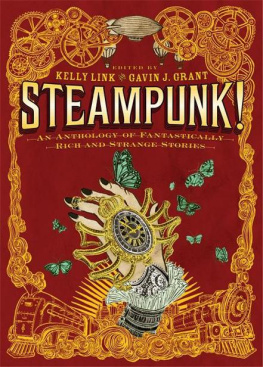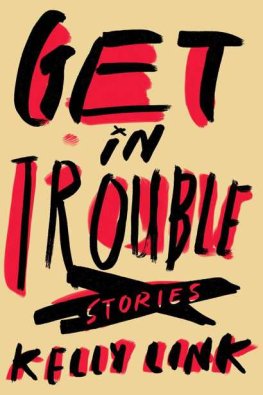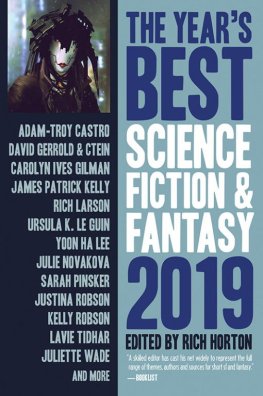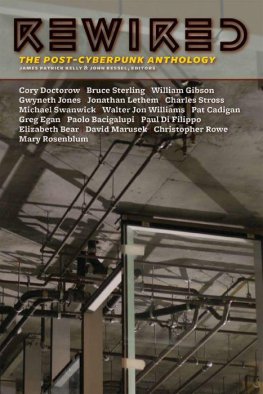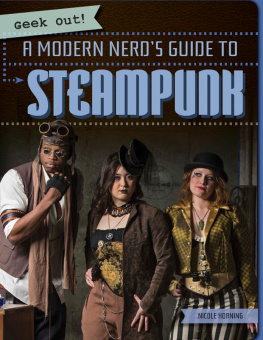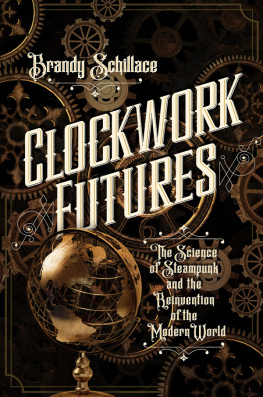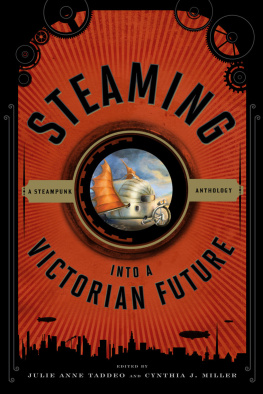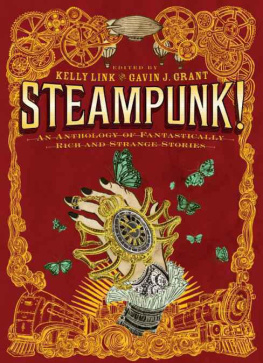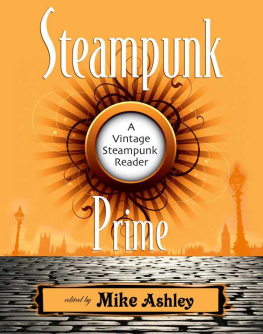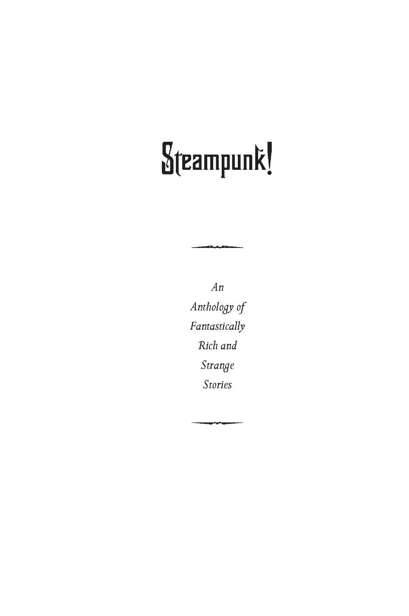
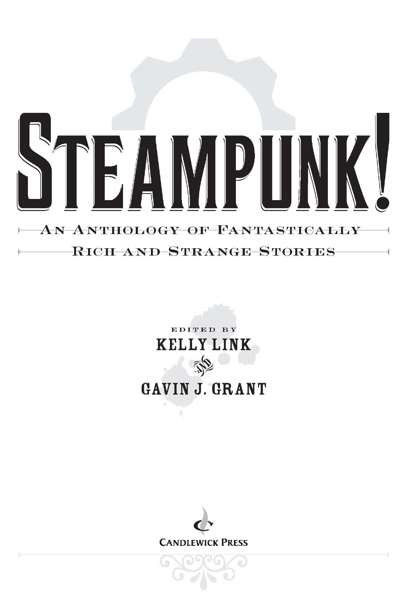
This is a workof fiction. Names, characters, places, and incidents are either products of theauthors' imaginations or, if real, are used fictitiously.
Compilation andintroduction copyright 2011 by Kelly Link and Gavin J. Grant
"SomeFortunate Future Day" copyright 2011 by Cassandra Clare
"The LastRide of the Glory Girls" copyright 2011 by Libba Bray
"ClockworkFagin" copyright 2011 by Cory Doctorow
"Seven DaysBeset by Demons" copyright 2011 by Shawn Cheng
"Hand inGlove" copyright 2011 by Ysabeau S. Wilce
"The Ghostof Cwmlech Manor" copyright 2011 by Delia Sherman
"Gethsemane"copyright 2011 by Elizabeth Knox
"The SummerPeople" copyright 2011 by Kelly Link
"Peace inOur Time" copyright 2011 by Garth Nix
"NowhereFast" copyright 2011 by Christopher Rowe
"FinishingSchool" copyright 2011 by Kathleen Jennings
"SteamGirl" copyright 2011 by Dylan Horrocks
"EverythingAmiable and Obliging" copyright 2011 by Holly Black
"The OracleEngine" copyright 2011 by M. T. Anderson
All rightsreserved. No part of this book may be reproduced, transmitted, or stored in aninformation retrieval system in any form or by any means, graphic, electronic,or mechanical, including photocopying, taping, and recording, without priorwritten permission from the publisher.
First edition2011 by
Library ofCongress Cataloging-in-Publication Data
11 12 13 14 1516 TK 10 9 8 7 6 5 4 3 2 1
Printed in TK,TK, U.S.A.
This book wastypeset in Golden Cockerel.
Candlewick Press
99 Dover Street
Somerville,Massachusetts 02144
visit us at www.candlewick.com


O rphans use the puppet of a deadman to take control of their lives. A girl confronts the Grand Technomancer,Most Mighty Mechanician and Highest of the High Artificier Adepts. Anothergirl, who might be from another universe, stuns everyone when she pulls out herhandmade Reality Gun.
Welcometo fourteen steampunk visions of the past, the future, and the not quite today.
Dependingon whom you believe, steampunk has been exploding into the world for the lasthundred years (thank you, Monsieur Jules Verne) or maybe the last twenty-five(when the term was first used by K. W. Jeter in a letter to Locus magazine).We have had fabulous fun working with this baker's dozen of authors,investigating some of the more fascinating nooks and crannies of the genre.
You'llfind the requisite number of gaslit alleys, intrepid urchins, steam-poweredmachines, and technologies that never were. Those are the basic accoutrementsthat no self-respecting steampunk anthology could be without, but as weassembled the book (filing down this story here, finding the right solder toput these two ideas together there), we discovered that steampunk has gone farbeyond these markers. The two Philips (Reeve and Pullman, respectively) broughtmoving cities and armored polar bears. Alan Moore and Kevin O'Neill's The Leagueof Extraordinary Gentlemen brought nineteenth-centuryLondon to a halt. Cherie Priest introduced zombies (Boneshaker), GailCarriger introduced vampires (Soulless), and Jeff andAnn VanderMeer brought it all together in Steampunk and SteampunkII .
Makersand artists have taken the romance and adventure of steampunk and remixed,reinvented, and remade the genre from whole cloth and, yes, brass widgets.We've spent hours wandering through the online galleries on Etsy and Flickr,marveling at the clockwork insects, corsets, art, hats, gloves, canes, moddedcomputers, and even a steampunk house (want!), and we lovethe DIY craftiness that keeps inspiring more decadent and more useful machinesand toys.
Thecontinuing reinterpretation of the steampunk idea made us ask the writers forstories that explored and expanded their own ideas of what steampunk could be.So we have a book of mad inventors, child mechanics, mysterious murderers,revolutionary motorists, steampunk fairies, and monopoly-breaking schoolgirls,whose stories are set in Canada, New Zealand, Wales, ancient Rome, futureAustralia, alternate California, and even the postapocalypse everywhere except VictorianLondon.
Kelly Linkand Gavin J. Grant


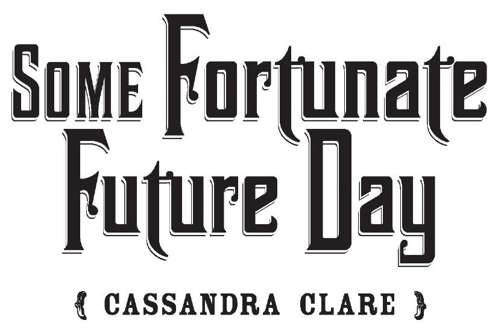
WhenI have seen by Time's fell hand defac'd
Therich-proud cost of outworn buried age;
Whensometime lofty towers I see down-raz'd,
Andbrass eternal slave to mortal rage;
WhenI have seen ... the kingdom of the shore,
Andthe firm soil win of the watery main,
Increasingstore with loss, and loss with store;
WhenI have seen such interchange of state,
Orstate itself confounded to decay;
Ruinhath taught me thus to ruminate
ThatTime will come and take my love away....
WilliamShakespeare, Sonnet LXIV
Timeis many things, her father told her. Time is a circle, and time is a greatturning gear that cannot be stopped, and time is a river that carries away whatyou love.
Whenhe said that, he looked at Rose's mother's portrait, hanging over theirfireplace mantel. He had invented his time device only a few short months aftershe had died. It had always been one of his greatest regrets in life, thoughRose sometimes wondered whether he could have invented it at all without theall-consuming power of grief to drive him. Most of his other inventions did notwork nearly as well. The garden robot often digs up flowers instead of weeds.The mechanical cook can make only one kind of soup. And the talking dolls nevertell Rose what she wants to hear.
"Doyou think he's ever coming back?" says Ellen. She means Rose's father. Sheis the dark-haired talking doll, the saucy one. She likes to dance around theroom, showing her ankles. She arranges the sugar cubes in the tea service toform rude words. "Perhaps he has taken to drink. I hear that is commonamong soldiers."
"Shush,"says Cordelia. Cordelia is the gentle doll, redheaded and quiet. "Ladiesshould not speak of such things." She turns to Rose. "Would you likemore tea?"
Roseaccepts more tea, though it is now more like hot water flavored with a fewleaves from the garden than real tea. She ran out of real tea months ago. Therehad been a time when food and tea and household goods were regularly deliveredby the grocer's boy from the nearby town. It was weeks after he stopped comingthat Rose got up the nerve to put on her bonnet, pick a few coins from the boxon the mantel, and walk alone into town.
Itwas then that she realized why the grocer's boy had stopped coming.
Thetown was flattened. Great zigzagging cracks ran through the streets, steamstill pouring out of them. Great sinkholes had opened in the ground, houseshalf tipped to the side.
Shewondered how she hadn't heard the destruction, though her house is more than amile away. But then, airships flew overhead almost every night, droppingincendiaries into the nearby forest, hoping to flush out spies and deserters.Perhaps she was simply used to it.
Next page
